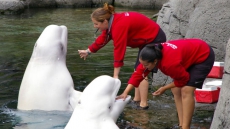PELLY CROSSING, Yukon — It's known as the toughest, coldest race on Earth and the ultra-marathon in Yukon certainly lived up to its reputation this year.
Temperatures dipped as low as -45 C as contestants raced more than 400 kilometres in the Montane Yukon Arctic Ultra, said race organizer Robert Pollhammer.
The cold was so persistent that about seven contestants had to drop out to seek medical attention for frostbite, he added.
"It's billed as the world's toughest and coldest for a reason. It's not just marketing — that's what it is. And unfortunately, this comes at a price. It can be dangerous," Pollhammer said.
Twenty-one people began the race in Whitehorse on Feb. 1, intending to go the entire 482 kilometre course either by foot, on cross-country skis or fat-tired mountain bikes.
Another 28 racers tackled shorter routes of either 42 kilometres or 151 kilometres.
South African runner Jethro De Decker, 35, was declared the winner of the longest course on Feb. 8 when he arrived at a checkpoint outside Pelly Crossing, Yukon.
Organizers had to stop the race about 60 kilometres from the official finish line for safety reasons, Pollhammer said.
By that time, all of the other contestants had dropped out, he added.
The runner-up, a cross-country skier from the Northwest Territories, had arrived at the previous check point with a frost-bitten finger.
While the race is always plagued by cold, this year's relentless deep freeze was unusual and made conditions difficult.
"From the start, that was brutal for everyone," Pollhammer said.
Snowmobiles that ride along the trail for safety had cables snap or engines refuse to start in the frozen temperatures, he added, which at times prevented race organizers from sending contestants out.
Most people who can no longer get warm stop racing, Pollhammer said, but part of the adventure is overcoming both the physical and mental challenges of traversing such a long distance in unforgiving conditions.
"There are a million things you need to keep in mind," he said. "It's just continuous problem-solving. The minute you stop solving your problems, you run into problems."
Ideally, people train in climates similar to Yukon's to get their bodies ready for the race, and Pollhammer said he's heard of some who prepare in industrial freezers.
"In the end, really, you can't 100 per cent prepare for it. Still, there's always going to be lessons to be learned, even for the more experienced guys," he said.
The ultra-marathon is run every year, and every two years there's an extra-long race of nearly 700 kilometres from Whitehorse to Dawson City.
Pollhammer said that is the most popular event, drawing fields of between 30 and 40 racers.
Results from last year's event show 17 people completed the mammoth course.
There's no prize money attached to the ultra-marathon, but Pollhammer said finishers do get a medal.



